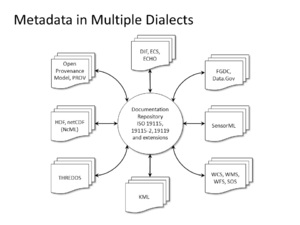Difference between revisions of "Amilan"
m (→Get Involved) |
m (→Get Involved) |
||
| Line 58: | Line 58: | ||
* '''Monthly Meeting''' | * '''Monthly Meeting''' | ||
| − | :* Our meeting will be the 4th week of each month on Mon or Thurs. Participate in the scheduling poll to help us determine the best | + | :* Our meeting will be the 4th week of each month on Mon or Thurs. Participate in the scheduling poll to help us determine the best day and time. Poll is open until Feb 12. [http://doodle.com/poll/2zp9qexcgm3ks2vf | Doodle Poll] |
Revision as of 18:05, February 1, 2016
ESIP Vision
“We dissect nature along lines laid down by our native language. Language is not simply a reporting device for experience but a defining framework for it.” Benjamin Lee Whorf
About Us
While Eskimos (and people that live in Colorado) have many words for what others call snow, and surfers have many words for what others call waves, ESIP members have many words for documentation. The goal of the Documentation Cluster is to improve understanding, utilization and integration of all of the dialects shown in Figure 1 and others used in the global environmental community. Equally important, we will work in the spaces between these dialects to build understanding from the similarities and differences between them.
A dialect is a "variety of a language that is a characteristic of a particular group". In the context of data sharing in ESIP, the ways that different groups document their data and products (i.e. metadata standards) are great examples of dialects. They are varieties of the over-arching language of documentation that are used by particular groups in ESIP and other partners in the global environmental community. Figure 1 illustrates this idea with a few commonly used dialects.
The ESIP Community is made up of scientists and informatics experts from a wide variety of disciplines and backgrounds. They come together at ESIP because they realize that they share common needs and hope that they can find others that can help them address those needs. For example, many ESIP members make observations and process them into datasets and products or run models that "predict" data in the past, present, or future. We all want to share those products with a variety of users and, more importantly, we want to make sure those users can discover, use, and understand those products.
The Documentation Cluster is an evolution of the original CF Cluster that was started by Rob Raskin and focused on the Climate-Forecast Conventions that are commonly used by netCDF and related tools. The CF Conventions are an important metadata dialect used by a number of ESIP members and their partners. The Documentation Cluster helps us keep in mind that the CF Conventions are only one of many dialects used by different ESIP groups.
EventsMeeting Agenda and Notes for 2016
Webex/Telecon Instructions:
Previous Meeting Agendas and Notes: |
Get Involved
|
Activities |
Resources (and Other Stuff)TBD |
